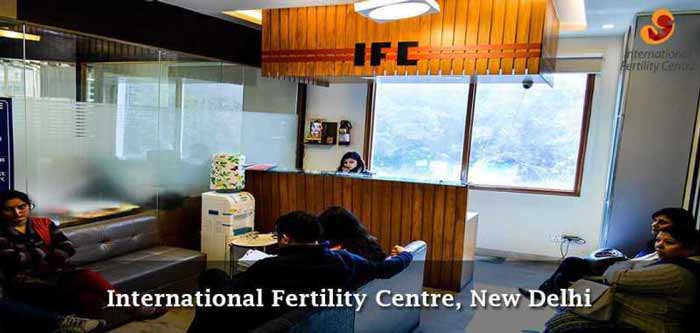IVF Treatment in Delhi
In Vitro Fertilization also known as IVF is a technique of assisted reproductive technology for infertility treatment. In vitro Fertilization (IVF) involves putting the eggs and sperm together outside the human body, by natural selection the egg will usually allow only one sperm to enter and this leads to the fertilization process in the laboratory.
After fertilization, the embryo are allowed to grow for a short period of time before being implanted it in a woman’s uterus. A successful pregnancy can be confirmed about 2 week later. IVF treatment is one of the most common and effective techniques available for improving the chances of pregnancy in women.
Why is IVF Treatment used?
IVF Treatment can be used to treat infertility with the following patients :
- Blocked or damaged fallopian tubes : The damage or blockage in tubes makes it difficult for an egg to be fertilized or for an embryo to travel to the uterus.
- Male Infertility : Men with low sperm concentration, weak movement of sperm (poor mobility), or abnormalities in sperm size and shape can make it difficult for sperm to fertilize an egg.
- Unexplained infertility : One in six couples suffers infertility problems and sometimes the causes remain unknown despite investigation
- Ovulation disorders : mean when ovulation fails to occur and are present in up to 20 percent of infertile couples.
- Premature ovarian failure : also known as premature ovarian insufficiency (POI) is the loss of function of the ovaries before age 40.
- Endometriosis : Endometriosis occurs when the lining of the uterus (womb) grows starts to outside of the uterus.
What is involved with in vitro fertilization?
What is involved with in vitro fertilization?
The basic steps involved in the IVF treatment and embryo transfer are as follows:
Preparing the Ovaries for Stimulation: Fertility medications are prescribed to suppress your natural menstrual cycle for about two weeks. After this, a patient is given fertility drugs to stimulate egg production. Multiple eggs are preferred because some eggs will not build up or fertilize after retrieval. Transvaginal ultrasound is used to study the ovaries, and blood test samples are taken to confirm hormone levels.
Collection of eggs: For the egg collection, a minor surgical procedure is carried that uses ultrasound imaging and involves a needle being inserted through the vagina and into each ovary. The eggs are then collected through the needle. In some cases, medication is provided to reduce and remove potential discomfort.
Fertilization of Eggs: The male partner is required to produce a sample of sperm, which is prepared for combining with the eggs. The collected eggs are mixed together with your partner’s or the donor’s sperm and stored in a laboratory to encourage fertilization. In some cases, if the male partner has low sperm count, intracytoplasmic sperm injection (ICSI) may be used. Through this procedure, a single sperm is injected directly into the egg in an attempt to achieve fertilization. The fertilised eggs (embryos) continue to grow in the laboratory for one to five days before being transferred back into the uterus.
Embryo Transfer: The best appearing embryos are selected for transfer. The physician will pass a catheter or small tube through the cervix into the uterus to transfer the embryos. This procedure usually does not require anesthesia, though some women may experience mild cramping, however, the patient usually leaves the office after a short recovery period. If the procedure is successful, implantation usually occurs around six to ten days following egg retrieval.
IVF Treatment in Delhi at IFC:

International Fertility Centre has been in service from past two decades and is known for its successful IVF treatment in Delhi. Before any other step, we conduct all diagnostic tests so that we can have a comprehensive picture of your fertility potential. Our experienced fertility specialists maintain highest priority in determining the cause of the problem, so that the correct treatment is recommended. When proceeding with IVF treatment in Delhi, you can be assured that the fertilization, development, and selection of embryos for transfer will be performed at the highest level of professional excellence by our team of embryologists.
Stimulation Protocol:
In an IVF cycle, stimulation and medication protocol is very important. There is a difference between failure and success. That is why, at our IVF Clinic in Delhi, we do not compromise on quality and use only the best fertility drugs available in the market from International Pharmaceutical companies such as Merck Serono and Ferring.
State-of-the-art Lab:
The Assisted Reproductive Technology (ART) Laboratory at International Fertility Centre features state-of-the-art equipment and uses an array of specialized laboratory equipment purposely built for the IVF industry.
Pregnancy Rates:
IFC has achieved a consistently good clinical pregnancy rate over the past years, comparable to other IVF clinics in India. At our IVF Centre, we have an average IVF success rate of 58% compared to 40% IVF success rates worldwide.
Fixed price fertility treatment packages:
With fixed price IVF and ICSI packages, patients get peace of mind and receive competitively priced first class treatment without the worry of any hidden costs.
IVF in India is economical and beneficial for childless couples to explore the chances of a successful conception.
Are you interested in a consultation with one of our specialist? Inform us with the case details of your infertility in the below section. Call us at 91 – 95555 44421 / 22 / 23 or write us at [email protected] to find out how we can help you.
